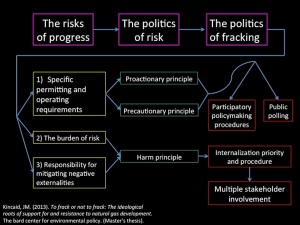I think Crane and Kennedy have a point here — relying on solar energy, specifically putting solar paneling on residential roofs, are a good way to reduce the risk of relying on an antiquated electrical grid system that’s highly vulnerable to storms and natural disasters (like Sandy). The traditional grid, knitted together by a bucolic web of wooden poles and copper wires, leaves society exposed should part of its fragile infrastructure fail.
So, switching to residential, distributive solar can be seen a precautionary move — it’s too risky to keep depending on a grid that falls apart if power lines go down with a tree limb. Independent, “off-grid” home power systems would strengthen each link of the social chain mail so that when nature throws us a curve ball we aren’t left in the dark for days or weeks on end. For the risk-averse, these are worthy concerns. Not to mention that solar energy doesn’t carry the bouquet of environmental and human health risks that accompany the extreme ways that we extract fossil fuels these days (horizontal drilling and hydraulic fracturing for natural gas, deep water drilling for oil, and mountaintop removal mining for coal).
Often we’ll hear opponents of renewables frame alternative energy as being too risky. The wind and sun are intermitted, the technology is inefficient, and the costs are uncompetitive — or so they say. But with better battery technology, dramatic improvements in solar cell efficiency, and expectations of lower home installation costs these arguments against renewables won’t hold water in public for much longer. Soon, in fact, this framing will probably reverse itself and renewables will be understood as safe, sensible, and reliable, while fossil fuels will be seen as dangerous, costly, and anachronistic.
But should we understand support for solar energy as precautionary or proactionary?
On one hand, using residential and distributive solar power is a precautionary move away from the risks of depending on fossil fuels and the outmoded electrical grid. In this sense, the switch to solar is less about the goodness of solar energy in particular, but rather about the consequence of mitigating the risks of fossil fuel use. To put it another way, to precautionary supporters of solar, it’s likely that any alternative energy source would be satisfactory since the shift is more about getting away from the risks of fossil fuels than it is about shifting to a particular kind of renewable energy.
On the other hand, proactionary supporters of solar might emphasize the goodness of solar energy itself over and above its consequence of replacing fossil fuels alone. Solar energy is good not simply because we need to mitigate the risks of fossil fuel use, but because solar energy represents progress. Fossil fuels remind us of primitive industrialism, while solar power speaks to our progressive refinement toward symbiosis with each other and the environment. Indeed, for proactionaries to put such immense trust in new solar technology despite its relative nascence is somewhat risky, but switching to solar is a matter of moral obligation; it is our duty to ourselves, to future generations, and to the non-human to make the change.
So, should we be proactionary or precautionary about solar power? I’m not convinced we have to choose — I support solar technology for precautionary and proactionary purposes. I am deeply concerned with mitigating the risks of our continued reliance on fossil fuels because they are inherently finite, unsustainable, environmentally damaging to extract, and pose threats to human health during development and when burned. Simultaneously, I believe that our relationship with the Sun is a special one and that it makes sense on ethical, axiological, and existential levels that the source of life should also be the source of high quality living.
Today, our visions of the Good Life are intimately intertwined with energy. High quality living means energy intensive living (with the exception of a few rogue primitivists out there). So the progressive challenge is making such a lifestyle sustainable. Progress, in this sense, is sustainability. But solar energy is not all about progress in the long-term. It’s also about human and environmental safety in the short-term.
Usually we find ourselves in a conundrum when it comes to the precautionary v. proactionary distinction: either we accept some risk as the price of progress, or we sacrifice some progress in order to mitigate risk. The difficulty arises when people make divergent value judgments about the proper balance of risk and progress — and also when we assume that the two routes are mutually exclusive.
Solar energy technology, however, defeats the idea that we can only reduce risk at the cost of progress. Making the gradual switch to solar constitutes progress toward sustainability and reduces the risks of using fossil fuels. We can be proactionary and precautionary at the same time. Now that’s progress.
Cheers!
Kincaid

